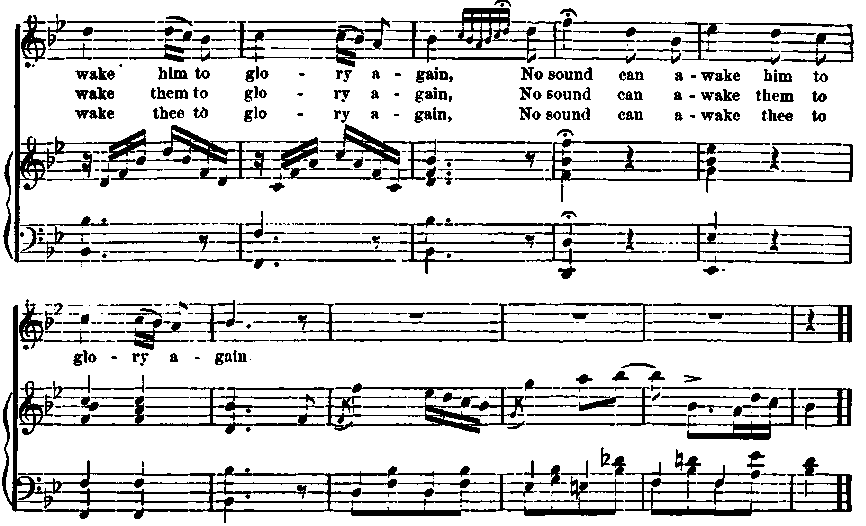Familiar Songs - Their Authors & Histories
300 traditional songs, inc sheet music with full piano accompaniment & lyrics.
| Share page | Visit Us On FB |
|
560 |
OUR FAMILIAR SONGS. |
||
 |
|||
|
THE BURIAL OF SIR JOHN MOORE.
Charles Wolfe, author of the following lyric, was born in Dublin, Ireland, December 14,1791. He was educated partly in England, and partly at Trinity College, Dublin. At the latter place he wrote the poems which have made him famous. He was naturally studious and thoughtful, and took orders in the Established Church. He died Feb. 21, 1823.
Medwin, in his " Conversations of Lord Byron/' tells of a discussion that Byron and others held as to which was the most perfect ode in the language. Shelley contended for Coleridge's on Switzerland, and, after Campbell and others had been canvassed, Byron said:
" I will show you an ode you have never seen, that I consider little inferior to the best which the present prolific age has brought forth." He left the table, and returned with a magazine from which he read " The Burial of Sir John Moore." After closing, he repeated the third stanza, and said it was perfect, particularly the lines:
" But he lay like a warrior taking his rest, With his martial cloak around him."
" I should have taken the whole for a rough sketch of Campbell's," said Shelley.
"No," replied Byron, "Campbell would have claimed them if they had been his." The historian says it was daylight when Sir John Moore was buried; but the " struggling moonbeams," and the " lantern dimly burning," will be forever present to the mind. Eev. H. J. Symonds, who performed the funeral service, says the officers of the staff earned the body to the grave which had been prepared for it on one of the bastions of the citadel, and, it being daylight, the enemy discovered that the troops had been withdrawing and embarking during the night. A fire was opened upon the ships, the brief funeral service was said, under fire of the guns, and the body was silently lowered in its " martial cloak." The poem was first published, anonymously, in the Newry Telegraph.
The music is the composition of John Barnett, an eminent English composer, who was born in Bedford in 1802. His father was a London jeweller, who when he saw his son's musical capacity, placed him under the tuition of Mr. Arnold, then manager of Drury Lane. Barnett developed a fine voice and taste, and was soon given the first place |
|||